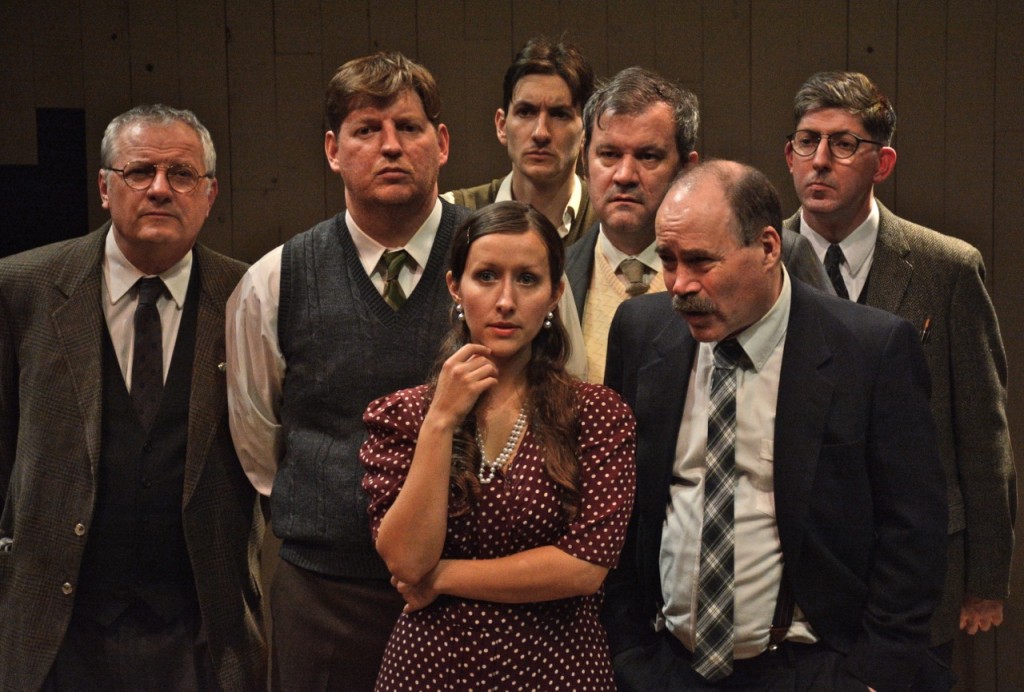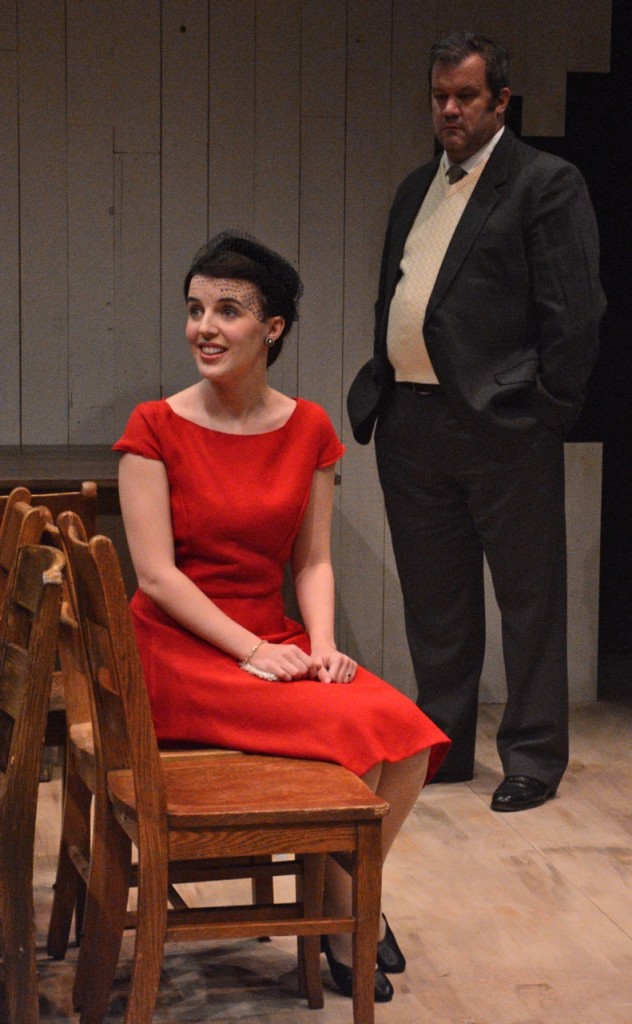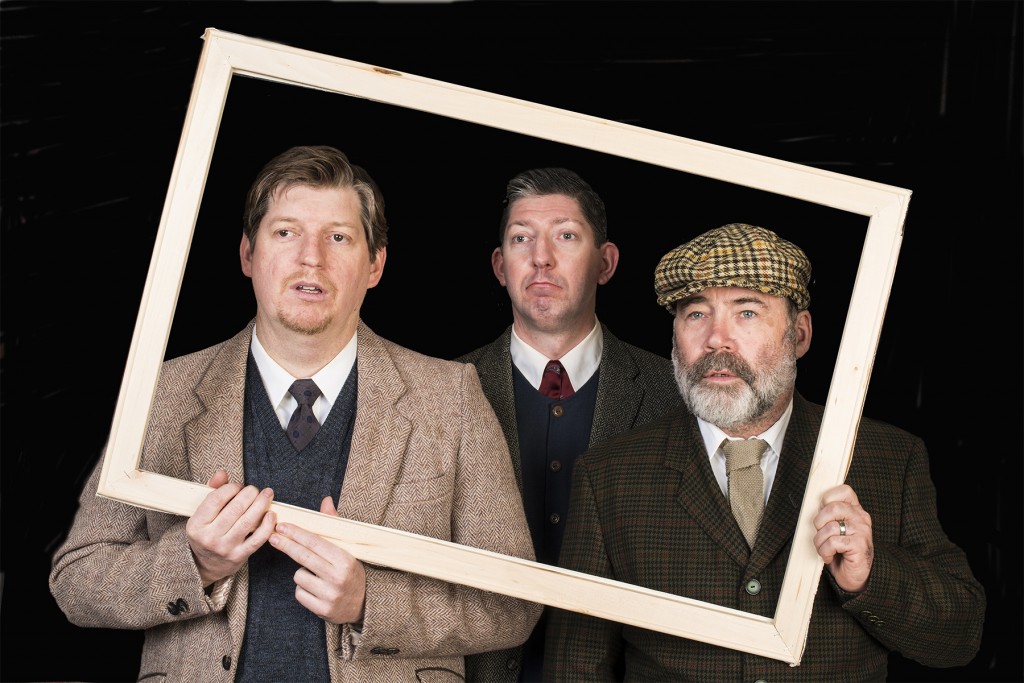
Credit: Nancy Caldwell
At the Jericho Arts Centre until February 16
604-224-8007/www.unitedplayers.com
Posted February 5, 2014
Act 1 of Lee Hall’s The Pitmen Painters is a gem: intelligent, relevant, provocative, political and funny; eighty minutes flies by.
Based loosely on a novel by William Feaver, it’s a true story about a handful of miners in Newcastle’s Ashington mine who signed up for Art Appreciation, an evening class offered through the Workers’ Educational Association when no lecturer could be found for Economics, their first choice. The miners had no interest in art, had never been to an art gallery and had never seen any original art anywhere. When the first lecture bogged down, Robert Lyon (Michael Wild), their earnest, bespectacled instructor, switched gears and started them ‘making’ art.
From this unlikely beginning came The Ashington Group that enjoyed a flurry of appreciation in Britain in the 1930s and 40s. While the men continued to go down into the pit day after day, their paintings crisscrossed the country, were exhibited in prestigious galleries and were bought up by avid collectors.
Jack Paterson does a stellar job of directing this group of (mostly) non-professional actors. The characters are as different as apples are from turnips and these performers carve them out so cleanly. Jimmy Floyd (John Prowse) is a bit of a dolt; Young Lad (Kurtis Maguire) is an angry, unemployed young man; George Brown (Keith Martin Gordey) is hung up on procedure; Harry Wilson (James Gill) is an outspoken critic of capitalism; Oliver Kilbourn (Paul Herbert) is the one who, more than the others, comes to see how art can change our lives. This is some of the best ensemble acting you’ll see; it’s tight and a real pleasure to watch.

Credit: Nancy Caldwell
Stephanie Dyck is pretty, young art student Susan Parks who’s ready, with a sparkle in her eye, to take her clothes off for the human form class, offered as “a nice surprise” by Mr. Lyon. Alexis Quednau is pert and spot-on as shipping company heiress and art collector Helen Sutherland.
Lighting design by Graham Ockley provides effects that often look like Magritte paintings: the men in overcoats and caps, backs to the audience, standing with smoke swirling around them or huddling together under blazing light, looking out at the audience. With the clanging of picks and shovels and the sound of the cage descending into the pit, sound designer Jeff Tymoschuk reminds us that these men are coal miners by day, painters by night.
Act 2, however, is too long and repetitive. Herbert (absolutely outstanding as Oliver) repeats what we have already ‘got’ in Act 1: a work of art is not good in and of itself; it’s how it affects the viewer that makes it meaningful.
It’s difficult, therefore, to understand Lyon, who after again and again proclaiming the unimportance of the ‘product’ as opposed to the ‘process’, simply dismisses the touring Chinese exhibit that he takes the men to see: “I don’t think there’s much evidence of any real skill. Quite clearly generic scenes – perfectly ordinary, really,” he sniffs. It’s evident that the pitmen are clearly impressed by how much the spare brush strokes – branches and cherry blossoms – say so much. So what’s with Lyon? Has he simply been patronizing them all along?
The playwright sets the miners up as labour class heroes while eventually exposing Lyon (and Sutherland) as condescending, upper crust art snobs. I’m not sure all that British class system criticism is all that relevant on this side of the pond.
The Pitmen Painters is an interesting play; I can’t, however, agree with The Guardian’s Michael Billington who says Hall has written a play that is “both a riveting social document and an invigorating political war-cry.”
But director Paterson and his cast of eight do a remarkable job of this almost three hour play. Once again, we have United Players to thank for bringing what New York and London audiences are talking about.
joledingham@telus.net

Credit: Doug Williams

